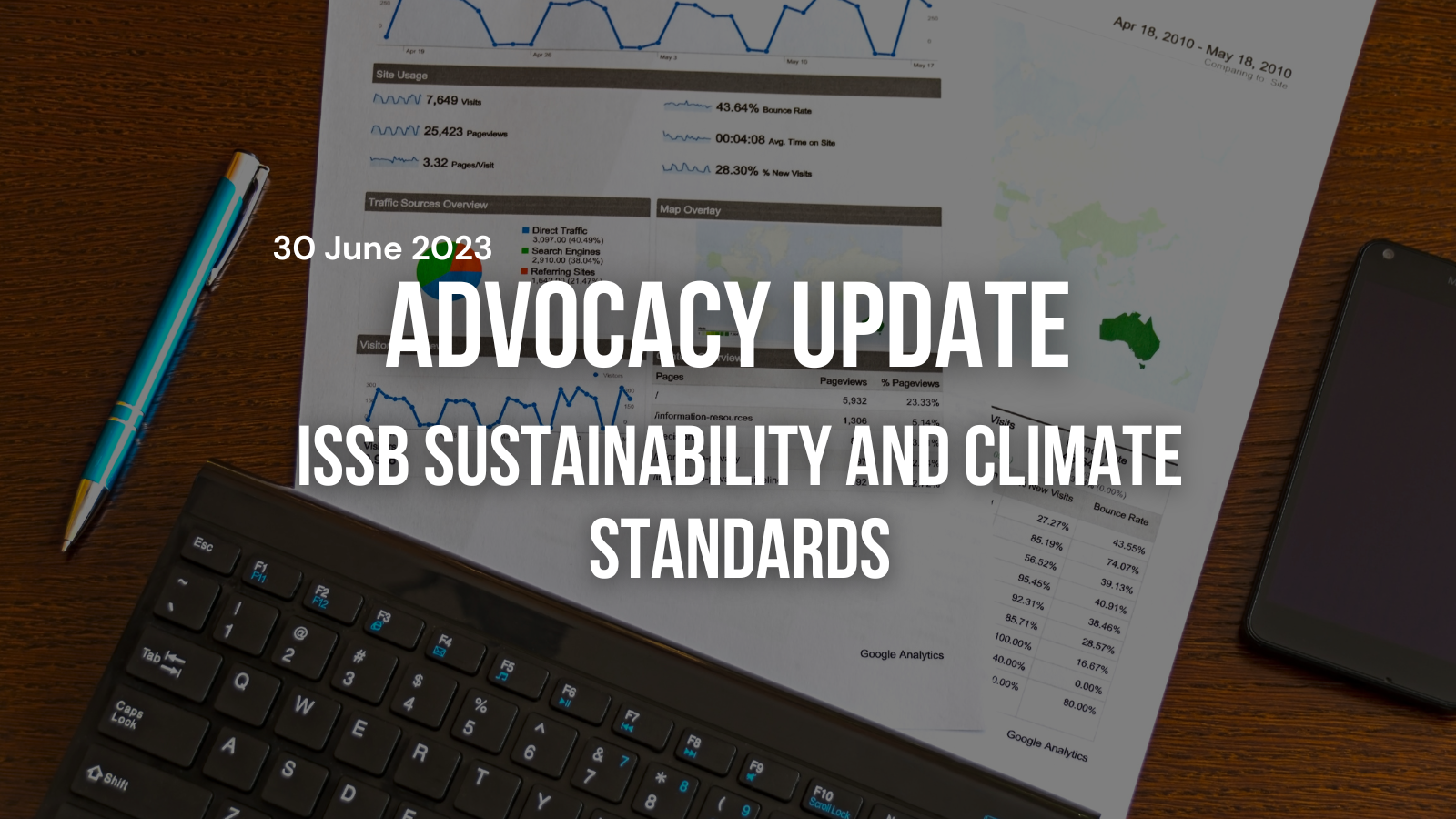

By Fiona Balzer, Policy and Advocacy Manager
30 June 2023
ASA supports a global approach to the development of sustainability disclosure standards.
A globally consistent, comparable, reliable, and verifiable corporate reporting system would provide all stakeholders with a clear and accurate picture of an organisation’s ability performance against common metrics.
This week the International Sustainability Standards Board (ISSB) issued its long-awaited IFRS Sustainability Disclosure Standards:
- IFRS S1 General Requirements for Disclosure of Sustainability-related Financial Information; and
- IFRS S2 Climate-related Disclosures.
IFRS S1 requires companies to communicate the sustainability-risks and opportunities on a short-, medium-, and long-term basis, and is intended to ensure that companies provide investors with information to support their decision-making.
IFRS S2 sets out specific climate-related disclosures and is designed to be used with IFRS S1.
Both standards build on the Task Force on Climate-related Financial Disclosures (TCFD).
We support a phased introduction for the disclosure of climate-related financial risks and opportunities in Australia to allow smaller companies and those with less impact on the environment to learn from and build upon the experience and evolution of larger companies.
You can read more here.
Second consultation on climate-related financial disclosures
Treasury has issued a second consultation paper on climate-related financial disclosure.
The paper is looking at how standardised, internationally‑aligned requirements for disclosure of climate‑related financial risks and opportunities, such as the ISSB’s standards, might be implemented in Australia.
The Federal Government is seeking views about how and when these reporting standards should be introduced. The consultation closes on 21 July, 2023.
For background on the issues, you can read ASA’s individual submission to the previous paper, and our collective response with 11 other professional, industry, investor, and research bodies.
ASIC Chair attends Parliamentary Committee
Joe Longo, the Australian Securities and Investments Commission (ASIC) Chair, appeared before the Parliamentary Joint Committee on Corporations and Financial Services this week.
He was questioned by the Committee about the oversight of ASIC, the Takeovers Panel, and the Corporations Legislation. You can read Mr Longo’s opening statement, and if you missed the screening of the hearing the transcript will be available soon.
In his opening statement, Mr Longo discussed the ASX’s delayed replacement of the Clearing House Electronic Subregister System (CHESS), and how ASIC’s supervisory approach to the project has changed over time.
Market and regulator confidence in the project has been impacted by the time it has taken to replace the existing system, and ASX has a lot of work to do to rebuild trust.
Investors expect that the national market infrastructure works smoothly, and any new system needs to be future proofed to give greater protection to investors.
While ASX is now engaging with market participants, and there is greater oversight by independent experts and regulators, there is clearly a need for a steering committee or an advisory panel to provide greater oversight of this critical project.
Mr Longo left the door open to this option, saying that “some additional oversight through an advisory body may be useful in the circumstances” as long as it’s clear about its remit and function. He stated:
“We are looking for assurance that any gaps or deficiencies are addressed before ASX pushes forward on the new CHESS replacement solution and any other future program ASX undertakes. We want to make sure ASX’s program management framework is able to successfully deliver programs of change and upgrades to Australia’s market infrastructure.”
After the hearing, ASX restated to the Chair of the Committee that no decision has yet been made about the replacement for CHESS.
ASA’s view on the replacement of CHESS is that there appeared to be underinvestment in the infrastructure which led to outages when trading peaked. Not what you want from your provider of national market infrastructure, and detrimental to smooth operation of financial markets and confidence.
The outages, and suggestions COBOL-based systems (the code associated with CHESS) were no longer going to be supported and a need to get ahead on technology, led to a proposal to use distributed leger technology in the project.
Since the CHESS Replacement project commenced, COBOL has had a new lease of life which enabled a substantial lift of the “old” CHESS trading volume capacity. The infrastructure still needs to be updated/replaced and future proofed, but at this time the existing infrastructure appears to be able operate adequately.





